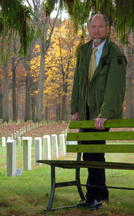
November 4, 2004
Professor: Military experience affects adolescents' self-esteem
WEST LAFAYETTE, Ind. – Serving in the military can make a young person proud, but a Purdue University sociologist's research shows that is not always the case.

|
Timothy J. Owens, an associate professor of sociology who studies self-concept and identity, says it is too early to tell how the self-esteem of the young men and women serving in today's military will be shaped by their experiences, and he cautions others to remember how the Vietnam War affected the self-esteem of some adolescent males who were involved.
"In some ways, nothing has changed for the adolescents today who are entering the military after 9/11," Owens says. "As the Iraq War drags on and becomes unpopular with some people, we must make sure Americans don't hate the warrior. Being angry with soldiers sent to do their duty can affect a young person's lifelong perception of their self.
"People with very low self-esteem, no more than about 15 percent of the population, tend to doubt themselves and separate themselves from others. For some of them that means living in a world of self-imposed isolation, and that can lead to depression, anxiety and misery."
Owens' analysis of the self-esteem of men who were involved in the Vietnam War is based on a group of high school students born in 1951. Many of the men who entered the military after their 1969 high school graduation were sent to Vietnam. Many also were sent to Korea or Germany.
Owens' research, which analyzed the feelings of self-worth of men who chose three different paths to adulthood after leaving high school – college, military or full-time work – is based on the Youth in Transition data set of 2,213 males from 80 American public schools. The study started in 1966 when the students were in 10th grade, and the last wave of data was collected in 1974. The Institute for Social Research at the University of Michigan conducted the Youth in Transition study. Owens' findings will be reported in his upcoming book, "From Adolescence to Adulthood in the Vietnam Era," to be published this month by Springer Press ($69.95). Previous research also has been published in the American Sociological Review, Social Psychology Quarterly, The Sociological Quarterly and Youth & Society.
"I wanted to know what happened to the self-images of these American boys who grew up during a period when we were extremely proud to be Americans," says Owens, who served as a scout in the 82nd Airborne Division from 1970 to 1972 and was not part of the data set. "Growing up, we thought we were the world's moral and military leaders. Then, everything changed in the 1960s and 1970s with the Vietnam War and widespread civil unrest. These males grew up expecting one thing and experienced something completely different in their young adulthood."
When these men returned from service, Americans' attitude toward patriotism was different, he says. Many Americans, especially the solders' own high school classmates and neighborhood friends, often treated veterans poorly because of dissatisfaction with the Vietnam War and the course the country seemed to be taking.
These feelings attributed to a significant decline in the feelings of self-worth of the veterans five years after leaving high school, Owens says.
"One assumes it would be the opposite, because the military is supposed to build you up, give you pride and a sense of accomplishment," he says. "Think about WW II's greatest generation. The Vietnam generation can be called the jaded generation."
However, Owens is not ready to label the group of men and women fighting in Iraq and Afghanistan.
"The experiences in war are so varied that it is hard to typify anything," he says. "There can be tremendous differences in the experiences of infantrymen, members of a tank crew or water purification specialists. Some people have great times and benefit, while others are destroyed physically, mentally or spiritually."
America's involvement in the Vietnam War began with President Harry Truman sending Army advisers and observers to Indochina in 1950 to address communist uprisings. In March of 1973, President Richard Nixon ordered a stop to offensive operations, which ended American fighting. The last U.S. troops left South Vietnam in April of 1975 with the fall of Saigon.
Owens is now working on a study about the 58,000 American military personnel, including those from the high school class of 1969, who were killed in Vietnam. Based on circumstances regarding those deaths, he is analyzing the probability of when someone would die during their 12-month predetermined tour of duty.
"People might assume that as the end of the tour approached, people became more careless. But, really, many became overly cautious and self-aware," he says. "This is important for today because the military is promising combat tours of specific duration. The troops like this option, but it also means that fixed tours of combat have unintended risks."
Owens' work is supported by the School of Liberal Arts and Purdue's Center for Behavioral and Social Sciences Research.
Writer: Amy Patterson-Neubert, (765) 494-9723, apatterson@purdue.edu
Source: Timothy J. Owens, (765) 496-6932, towens@soc.purdue.edu
Purdue News Service: (765) 494-2096; purduenews@purdue.edu
Related Web sites:
Purdue Department of Sociology and Anthropology
PHOTO CAPTION:
Timothy J. Owens, a Purdue University associate professor of sociology who studies self-concept and identity, says it is too early to tell how the self-esteem of the young men and women serving in today's military will be shaped by their experiences. He cautions others to remember how the Vietnam War affected the self-esteem of some adolescent males who were involved. Owens' research, which analyzed the feelings of self-worth of men who chose three different paths to adulthood after leaving high school – college, military or full-time work – in 1969 will be reported in his upcoming book, "From Adolescence to Adulthood in the Vietnam Era," to be published by Springer Press this month. (Purdue News Service photo/David Umberger)
A publication-quality photograph is available at https://ftp.purdue.edu/pub/uns/+2004/owens-vietnam.jpg
To the News Service home page